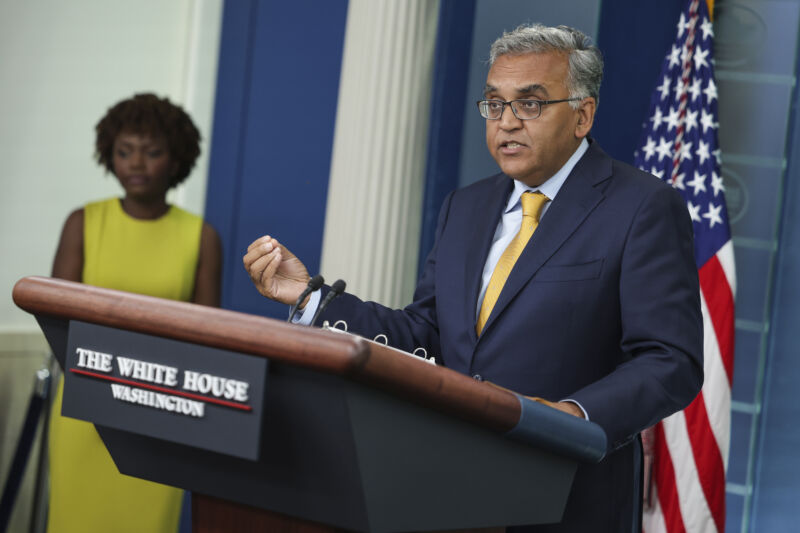
COVID-19 vaccination for children ages 6 months to under 5 years—the only age group yet to be eligible for vaccination—is expected to get underway on June 21, White House COVID-19 Response Coordinator Ashish Jha said in a press briefing Thursday.
The Food and Drug Administration is now reviewing data from Moderna and Pfizer-BioNTech on their respective vaccines for the young age group. The agency will convene its panel of independent expert advisers to review the data on June 15 and vote on whether the vaccines should be granted emergency use authorization.
If the panel votes in favor of authorization, the FDA will likely grant it quickly. Once that happens, shipments of federal supplies of the vaccines will begin going out to states for distribution. But, before they can go into little arms, the Centers for Disease Control and Prevention will need to have its own advisory committee meeting to review the data and vote on a recommendation. And for the final step, CDC Director Rochelle Walensky will need to endorse the recommendation.
There are approximately 18 million children in the US under 5, and the federal government has "plenty of supply of both Pfizer and Moderna vaccines" for the age group, Jha said. Starting Friday, states can begin placing orders from an initial supply of 10 million doses. The Biden administration is working with states, local health departments, pediatricians, family doctors, other health care providers, and pharmacies to prepare for the vaccine rollout.
"We expect that the vast majority of these kids will be vaccinated by their primary care providers," Jha said. To start, the administration is asking states to prioritize distribution to sites serving the highest-risk children in hard-to-reach areas and sites that can handle large volumes of children, such as children's hospitals. Officials are also encouraging states to have vaccination sites open outside of work hours to make it easier for parents to get their children immunized.
Rollout and questions
Jha was careful to note that the administration is not trying to "prejudge the outcome of the process," but it is preparing for all scenarios. The administration expects the FDA to decide quickly after the advisory meeting on June 15, which is a Wednesday. The following weekend is a three-day weekend, given the federal observance of Juneteenth. If all goes to plan, "we expect some of the shipments to start arriving to their destination over that long weekend," Jha said.
Given that the CDC will still need to sign off on use and that many doctors' offices will be closed for the holiday, "we expect that vaccinations will begin in earnest as early as Tuesday, June 21, and really roll on throughout that week," he said. But, he cautioned, "it will take some time to ramp up the program and for vaccines to be more widely available."
The long wait for vaccines for the youngest children during the two-and-a-half-year pandemic has been excruciating for many parents, particularly as cases are again on the rise and many areas have pulled back health precautions. Parents and lawmakers have also sharply criticized the FDA for what has been seen as a slow-walking of Moderna's vaccine. In April, Politico reported that the FDA was considering delaying Moderna's review to wait for data from Pfizer and BioNTech. The FDA has since repeatedly denied any purposeful delay.
Moderna requested FDA authorization on April 28 and finished submitting its vaccine data to the regulator on May 9. However, FDA advisers will review that data while reviewing information on the Pfizer-BioNTech vaccine, which was fully submitted on June 1.
In the press briefing Thursday, Jha was asked again about the apparent delay of Moderna's review. Although he deferred to the FDA on specifics, he said the regulator makes its timeline based on how quickly it can review all the data. "At the end of the day, we all want to move fast, but we want to get it right," he said, "and that has got to be priority number one and that's what I think the FDA has been focused on."
You must login or create an account to comment.